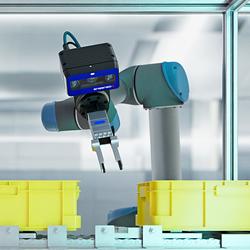MIT Wants Robot Servants to Flexibly Juggle Chores
Rosie the robot maid may not remain a 'Jetsons' fantasy for too much longer. MIT computer scientists have honed a decision-making process that may help robots juggle diverse chores such as preparing dinner or loading laundry into the washing machine. That means getting robots to do advance planning to accomplish their goals, but not planning out each step in such detail as to leave robots without room for flexibility. It's similar to how humans know how to get to the airport early and check in to board a plane, but don't plan their exact walking routes through the airport. "Were introducing a hierarchy and being aggressive about breaking things up into manageable chunks," said Tomas Lozano-Pérez, co-director of MITs Center for Robotics. The MIT approach creates a rough timeline of what robots may need to do, but plans detailed moves for only the first few steps. That may not be as efficient as a robot that follows a set of detailed commands like a choreographed ballet to tackle the household chores, but it allows for the unknowns
Featured Product

